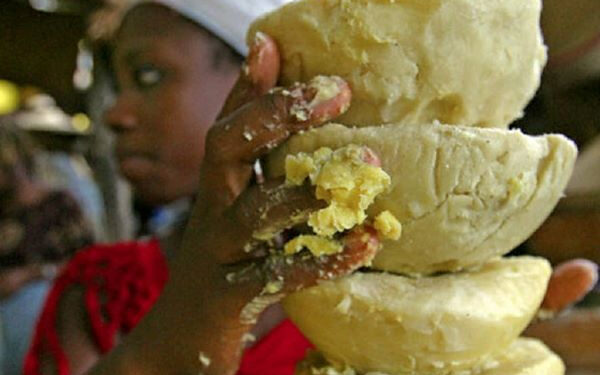The Upper East Region is one of the leading hubs of sheanut trees in Ghana. This being the case, one would assume that the nuts would be in abundance and consequently cheap. This will be a fallacy, as the reverse is the case.
Shea butter producers, who double as sellers, are currently in a state of despair. This follows the high cost of the nuts on the market. They have attributed the high cost of the nuts to an invasion of the shea nut market by some business persons.
They noted that before the infiltration, a paint bucket of the nuts was sold at two cedis fifty pesewes(2.50) which is now sold at 30cedis. A paint container full of shea butter was 30 cedis at the time now goes for 120 cedis.
This is subject to change after the season. One would need four paint containers full of peanuts to be able to produce a paint full of shea butter.
They further noted that it was 30 cedis because the sheanut fruits are in season. They indicated that the price would definitely go high after the season. They pointed out that this had been the case, for the past four years.
They explained that these people come and put them in trucks. Most of these women are aged and some, are widowed. They come to the Bolgatanga market from neighbouring communities and villages to sell.
These women are typically from the age of 50 and above. They learned the trade years ago and have been surviving on that. The shea butter-making process is very tedious and time-consuming. It involves drying roasting, visiting the grinding mill a number of times, and doing some physical work on them. They are appealing for loan support so that their hard work will not go unrewarded. They spoke to Ghanaweb’s Sarah Dubure in the Bolgatanga new market.
Madam Asibi Yinduri noted with worry that the nut sellers prefer selling their commodity to business persons because they have more money. “They would rather sell to them over us. Sometimes when you want to buy, they would say that politicians have ordered. Who are these people that have ordered? She quizzed. She complained that they are sometimes left handicapped, as they sell all to strangers and leave them.
“What do we have? We are poor and can’t afford, so they prefer selling to those who have the money”, she said. Madam Asibi appealed for support by way of loans to them, so that they could sustain their business. “We can’t stop them from buying, all that we need are loans, so that we can be able to buy for our businesses not to collapse”.
She added. Madam Theresa Naahu appealed to the government to support them with loans so that they could always buy much of the nuts and store them when they were in season. “We are suffering. The government should help us so that we can buy the shea nuts during the rainy season and store them”.She pleaded. She noted that more people are now patronizing frytol over shea butter because according to them, it is cheaper.
“They always say that frytol is cheaper than the shea butter, so they will rather buy that one”. She complained. She lamented that anytime they did not buy their shea butter, they got worried about how their children would be fed. “If they don’t buy, we get very worried about how the children will eat. My child is currently in school. They are asking for fees. How will l pay? I’m only relying on God, she cried.
Madam Dong Boapok stated that she always had to cover a long distance to the Bolgatanga market to sell her shea butter. She noted that due to the high cost of the shea nuts, she is not always able to produce much. She lamented that she always ends up bringing just a little of the shebutter to sell and at the end of the day, has to take part of the money for her lorry fare. This according to her, brings her profit down to nothing. She therefore calls on the government and benevolent bodies to grant them loans to be able to continue their business


